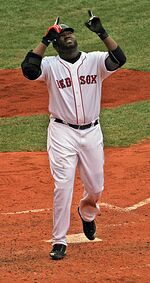Travesty
“Any runner is out when...he runs the bases in reverse order for the purpose of...making a travesty of the game.”
A travesty is the thing that the game of baseball is not. The Official Baseball Rules state that a runner who tries to make the game a travesty is to be removed from his base. Such a player is off-base, for which the remedy is for him to be put off-base.
Running the bases backward[edit]
A baserunner dances and gestures and fakes that he is trying to run to the next base, knowing that he is "out" if tagged with the ball between bases. His goal is to get closer to going all the way around, which scores a point, except that fans who call it a point are making a travesty of the game. They are laughed at and nagged that "we" call it a run.
A baserunner who fakes running to the previous base — who dares the pitcher to pay attention, lest he render himself further away from scoring a run — could cause the pitcher to hurt himself as his jaw dropped too quickly and perhaps hit the "pitcher's mound." The pitcher and other defensive players could also injure themselves by laughing too hard. This would make a travesty of the game.
For example, during the next commercial break, when David Ortiz stood next to a can of beer, of course prohibited by law from saying what beer is, whether it tastes good, or why you would pick that brand except that it is Ortiz's brand, the viewer would be thinking, "That is the stiff who ran the bases backwards! I am not going to drink the same brand of beer!" A National Pastime that could not sell beer would be rendered a travesty.
Not a travesty[edit]
The concept of travesty is best understood by studying the non-travesty. The following things are not travesties:
- To have dozens of "player safety" rules but enshrine the tradition that when a pitcher serves up a ball that the batter hits out of the park, or especially if the batter takes an extra second admiring it before starting his waddle around the bases, then the pitcher has a sacred duty to throw the baseball at 90 miles per hour at the body of the next batter.
- To hold up baseball players as "role models" that every child looks up to and tries to be just like, and yet to expect each one to deny the obvious and to lie to the authorities to try to angle for a tiny bit of additional advantage.
- To artificially extend careers through year-'round training regimens, or by cutting tendons out of the body and using them to sew a kneecap back together, but never by taking nature's own bodybuilding chemicals. It can be argued that the ballplayer owns his body and has the right to wreck it with steroids to get .005 more on his batting average, but the concern is future generations emulating him and wrecking their bodies as well. As for those future generations spending fifteen of the best years of their lives in Minor League Baseball in the futile pursuit of rising to a level where the salary actually pays the rent, that is okay.
Above all, having a 240-page rulebook to play a schoolboy's game, and getting paid $20 million a year to do so — or to not do so because you arrived at spring training every bit as out-of-shape as you were by the end of the previous season — is not a travesty.

